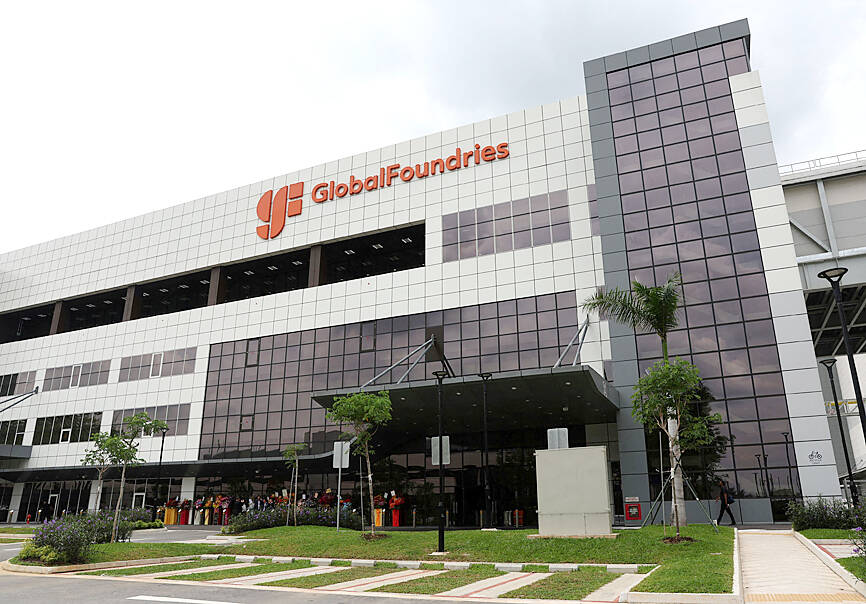The US on Friday said it imposed a US$500,000 penalty on New York-based GlobalFoundries Inc, the world’s third-largest contract chipmaker, for shipping chips without authorization to an affiliate of blacklisted Chinese chipmaker Semiconductor Manufacturing International Corp (SMIC, 中芯).
The US Department of Commerce in a statement said GlobalFoundries sent 74 shipments worth US$17.1 million to SJ Semiconductor Corp (盛合晶微半導體), an affiliate of SMIC, without seeking a license.
Both SMIC and SJ Semiconductor were added to the department’s trade restriction Entity List in 2020 over SMIC’s alleged ties to the Chinese military-industrial complex. SMIC has denied wrongdoing.

Photo: Reuters
Exports to firms on the list require a difficult-to-obtain license, which GlobalFoundries did not apply for, the department said.
“We want US companies to be hypervigilant when sending semiconductor materials to Chinese parties,” US Assistant Secretary for Export Enforcement Matthew Axelrod said in a statement that highlighted GlobalFoundries’ voluntary disclosure of the violation and extensive cooperation with the commerce department.
GlobalFoundries in a statement said the company regrets “the inadvertent action, due to a data-entry error made prior to the entity listing,” which caused it to accidentally ship the legacy chips without a license.
“We strive to, and believe we have, a world-class trade compliance program that sets the standard for the foundry industry,” it added.
US lawmakers have grown more concerned that the commerce department, which oversees export policy, might not be aggressively enforcing its regulations as Washington seeks to stop China from receiving sensitive US technology that could bolster the Chinese People’s Liberation Army.
Influential Democratic Senator Mark Warner on Thursday criticized US President Joe Biden’s administration for “apparent lax monitoring” of Taiwan Semiconductor Manufacturing Co (TSMC, 台積電) following revelations a chip produced by the Taiwanese chipmaker ended up in a product made by China’s heavily sanctioned Huawei Technologies Co (華為).
It also comes as GlobalFoundries, majority owned by Abu Dhabi’s sovereign wealth fund Mubadala Investment Co, is slated to receive about US$1.5 billion from the commerce department to build a new semiconductor production facility in Malta, New York, and expand existing operations there and in Burlington, Vermont.
The grant is part of a US program to encourage chipmakers to expand production in the US.

SEMICONDUCTORS: The German laser and plasma generator company will expand its local services as its specialized offerings support Taiwan’s semiconductor industries Trumpf SE + Co KG, a global leader in supplying laser technology and plasma generators used in chip production, is expanding its investments in Taiwan in an effort to deeply integrate into the global semiconductor supply chain in the pursuit of growth. The company, headquartered in Ditzingen, Germany, has invested significantly in a newly inaugurated regional technical center for plasma generators in Taoyuan, its latest expansion in Taiwan after being engaged in various industries for more than 25 years. The center, the first of its kind Trumpf built outside Germany, aims to serve customers from Taiwan, Japan, Southeast Asia and South Korea,

POWERING UP: PSUs for AI servers made up about 50% of Delta’s total server PSU revenue during the first three quarters of last year, the company said Power supply and electronic components maker Delta Electronics Inc (台達電) reported record-high revenue of NT$161.61 billion (US$5.11 billion) for last quarter and said it remains positive about this quarter. Last quarter’s figure was up 7.6 percent from the previous quarter and 41.51 percent higher than a year earlier, and largely in line with Yuanta Securities Investment Consulting Co’s (元大投顧) forecast of NT$160 billion. Delta’s annual revenue last year rose 31.76 percent year-on-year to NT$554.89 billion, also a record high for the company. Its strong performance reflected continued demand for high-performance power solutions and advanced liquid-cooling products used in artificial intelligence (AI) data centers,

Gasoline and diesel prices at domestic fuel stations are to fall NT$0.2 per liter this week, down for a second consecutive week, CPC Corp, Taiwan (台灣中油) and Formosa Petrochemical Corp (台塑石化) announced yesterday. Effective today, gasoline prices at CPC and Formosa stations are to drop to NT$26.4, NT$27.9 and NT$29.9 per liter for 92, 95 and 98-octane unleaded gasoline respectively, the companies said in separate statements. The price of premium diesel is to fall to NT$24.8 per liter at CPC stations and NT$24.6 at Formosa pumps, they said. The price adjustments came even as international crude oil prices rose last week, as traders

SIZE MATTERS: TSMC started phasing out 8-inch wafer production last year, while Samsung is more aggressively retiring 8-inch capacity, TrendForce said Chipmakers are expected to raise prices of 8-inch wafers by up to 20 percent this year on concern over supply constraints as major contract chipmakers Taiwan Semiconductor Manufacturing Co (TSMC, 台積電) and Samsung Electronics Co gradually retire less advanced wafer capacity, TrendForce Corp (集邦科技) said yesterday. It is the first significant across-the-board price hike since a global semiconductor correction in 2023, the Taipei-based market researcher said in a report. Global 8-inch wafer capacity slid 0.3 percent year-on-year last year, although 8-inch wafer prices still hovered at relatively stable levels throughout the year, TrendForce said. The downward trend is expected to continue this year,